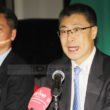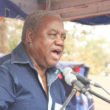Veteran politician Vernon Mwaanga says Zambia has a lot to gain from maintaining a special relationship with China but government should be careful with how it borrows money.
In a statement, Tuesday, Mwaanga observed that Zambia had enjoyed a favorable trade surplus with China since independence.
“Notwithstanding debt repayments for this Tazara loan, other agricultural and infrastructure loans, Zambia has enjoyed a favorable trade surplus with China since independence. It is worth noting that there has been adverse public debate about some of the more recent loans and their questionable benefits and usage. This is understandable, but should not overshadow the long history of relations between our two countries, which have pursued policies and programmes based on a “win win” situation,” Mwaanga stated.
Mwaanga noted that Zambia had a lot to gain from China but asked government to be careful with how it borrowed money from that country and what it used it for.
“China should remain an all weather friend of Zambia and that when problems between the two countries arise – which is inevitable – the leaders must quickly address these and resolve them in a pacific manner. Zambia has a lot to gain from maintaining a special relationship with the second largest economy in the world, but we should also be careful how we borrow money from China and what we use it for. Alarm bells are ringing loudly and citizens are asking legitimate questions about some areas of trade and commerce, which should rightly be reserved for Zambians only, as is the case in China. The government has a duty to listen to its citizens’ concerns,” he stated.
And Mwaanga noted that it was a historical fact that China actively supported Zambia’s and Africa’s struggle for independence.
He stated that after independence in 1964, Zambia established diplomatic relations with China and pledged to work tirelessly to deepen their relations through political, diplomatic and economic co-operation.
Mwaanga noted that Zambia also made a commitment to work with other countries in the United Nations to restore the lawful rights of China in the UN and enable it assume its rightful permanent seat in the security council.
“It is a historical fact that the People’s Republic of China actively supported Zambia’s and Africa’s struggle for independence. One day after our independence on October 24, 1964, Zambia established diplomatic relations with China and pledged to work tirelessly, to deepen these relations through political, diplomatic and economic co-operation. Zambia also made a commitment to work with other progressive countries in the United Nations, to restore the lawful rights of China in the United Nations and enable it assume its rightful permanent seat in the security council, which was being illegally occupied by Taiwan , which Zambia always regarded and still regards as an overseas province of China,” he stated.
“We kept our promise. Our first President Dr Kenneth Kaunda, led Zambia’s first delegation to the United Nations General Assembly, where the late UN Secretary General U Thant, conducted a ceremony in front of the UN Headquarters and raised our flag, to admit Zambia as the 114th member of the United Nations. In his first address to the General Assembly in November, 1964, President Kaunda called for the restoration of China’s lawful rights in the United Nations. He set the tone which was to guide our foreign policy on China to this day.”
Meanwhile, Mwaanga recollected that when he was appointed Zambia’s Ambassador to the United Nations in March 1968, he mounted a vigorous campaign for China’s rights to be restored in the United Nations.
“When I was appointed Zambia’s Ambassador to the United Nations in March 1968, I quickly got into my stride and mounted a vigorous campaign for China’s rights to be restored in the United Nations. I worked closely with the Ambassador of Tanzania Salim Ahmed Salim and others from Africa, Asia, Europe, Canada, South America and the Caribbean. We then co-sponsored a resolution to restore China’s rights in the world body in 1968, 1969, and 1970, which failed to pass. After our renewed campaigns which even involved travel to many world capitals, the resolution finally passed late night of 25th October, 1971,” stated Mwaanga.












